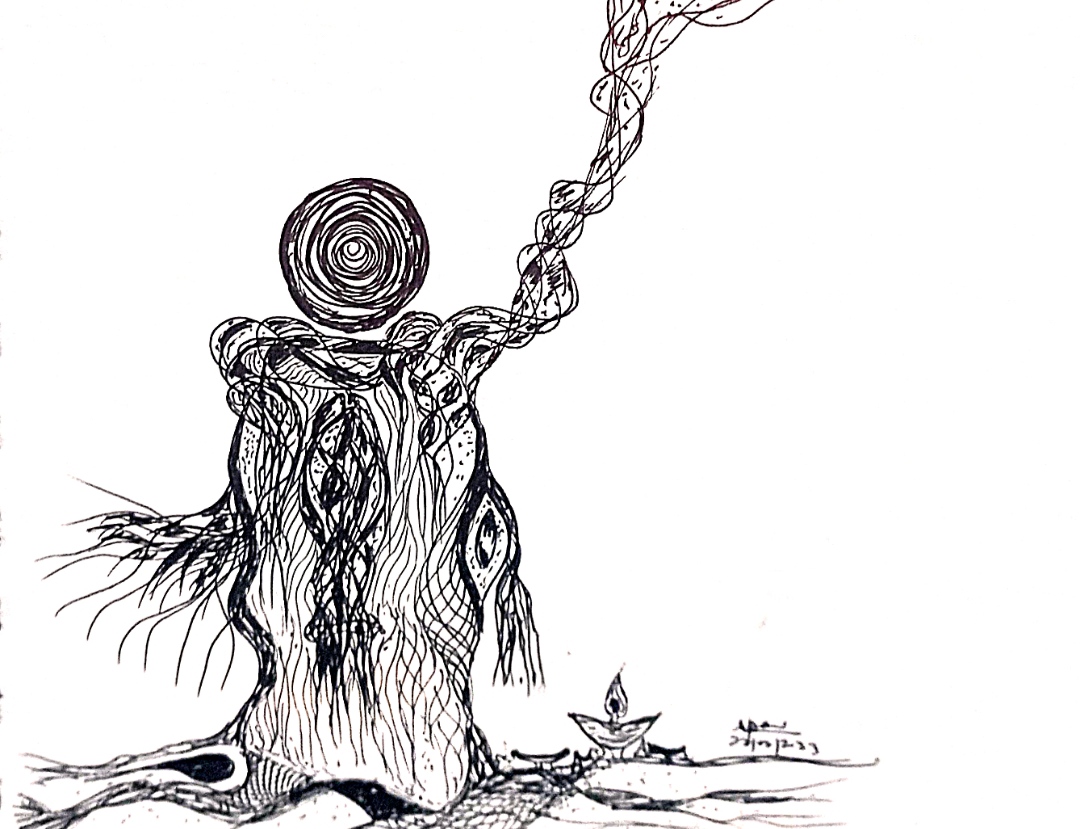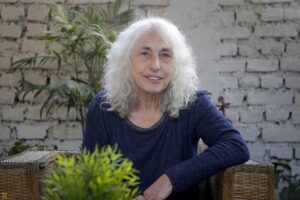
Editor’s Choice

Poems by Alicia Partnoy
(Translated by Julia Horton)
Violencia doméstica
Con sus besos de espumas en el viento
y una cebolla,
agradece la mar que le limpiemos
la piel del costado, malherida
por la basura humana.
Como mujer abusada, siempre vuelve
a nosotros con un nuevo vestido.
El de hoy es verde, adornado de puntillas,
y entonces no podemos resistirlo:
Con la ira de los civilizados
seguimos infectando su cintura
con nuestro esperma enfermo.
Y después esperamos, desgarrados,
sus dulces besos de espumas en el viento
y esa cebolla.
Domestic Violence
With its kisses of windblown foam
and an onion,
the sea thanks us for cleaning up
the flesh of its side,
gravely wounded by human filth.
Like a battered woman, it always comes
back to us wearing a new dress.
Today’s is green, adorned with lace edging,
so we cannot help it–
with the wrath of the civilized,
we continue to defile her waist
with our sick semen.
And afterward, torn, we wait
for its sweet kisses of windblown foam
and the onion.
Corazonada
Yo creo en el amor de la naturaleza,
que la mar nos acuna, que la luna nos besa,
que la copa de ese árbol protege tu cabeza
y el rumor de aquel río su plegaria nos reza.
Yo creo en el amor, pero decir me pesa,
también creo en el odio de la naturaleza:
Harta ya de mentiras como la mujer esa,
borracha de despecho,
arrasa con tu casa,
arrasa con tu techo…
…y no la tranquilizan los arrepentimientos.
Sabe que es imposible deshacer lo que has hecho.
Heartfelt Premonition
I believe in the love that nature has for us,
the sea that cradles us, the moon that kisses us,
the treetops that shelter your head from above,
and the river that whispers the prayers it lifts up.
I believe in its love, and though it pains me to say,
I also believe that nature is full of hate:
fed up with lies like that woman, wasted, who
reels with spite,
levels your house,
levels your home. . .
. . . remorse and repentance do not pacify her.
She knows what you’ve taken cannot be returned.
Ecos lógicos
El beso letal del mar se va acercando a tus plantas,
el pecicidio del hombre deja su huella en la playa.
Si sales a caminar, por donde quiera que vayas,
irás pensando maneras de librar esta batalla.
El beso letal del río ya se aproxima a tu casa,
las grandes corporaciones te han envenenado el agua
y si te dejan hablar, por donde quiera que vayas,
irás reclutando gente, pa’ ganar esta batalla.
Logical Echoes
The lethal kiss of the sea draws closer to your soles,
and mankind’s pescacide leaves its footprint on the shore.
If you set out to walk, wherever you may go,
you’ll think of how to wage and how to win this war.
The deadly caress of the creek by now approaches your door,
corporate conglomerates taint your water, no remorse.
If they allow you to speak, wherever you may go,
you will call up allies to wage and win this war.
Mapa de ruta
Tus pies negros de brea de las arenas,
tus ojos contra ese viento que hace llorar,
voces finas de niños hoy te apedrean
y un arrullo de espumas te ruge el mar…
No detengas el paso, la noche es tuya,
para llegar a ella habrás de cruzar
mañanas de aeropuertos,
tardes de brumas
y anocheceres rojos de tanto amar.
Nunca le tengas miedo al horizonte
en donde el mar y el cielo saben hablar
un idioma repleto de desencuentros
que suelen disolverse en sol y sal.
Y aunque ahora no sepas por qué camino
al puerto de tu dicha habrás de llegar,
no te des por vencida ni aún vencida,
alma fuerte de mi alma, rosa de paz.
Road Map
Your feet tar-black from traversing the sand,
your eyes set against that tear-jerking wind,
today children’s voices pelt you like stones
and the sea bellows for you with a murmur of foam . . .
Don’t hold back your step–the night, it is yours,
to reach her at last you will have to endure
mornings in airports,
afternoons thick with fog,
and sunsets stained red from ardor and want.
Don’t ever be scared of the looming horizon
where the sea and the sky, they know how to speak
a language replete of disputes, which resolve,
dissolving themselves ‘tween the sun and the salt.
And even though now you know not by which road,
to the door of your fortune one day you will come–
you’ve not been defeated even when you have lost,
strong soul of my soul, rose of peace, carry on.
Alicia Mabel Partnoy

(born 1955 in cia Mabel PartnoyBahía Blanca, Argentina) is a human rights activist, poet, college professor, and translator.After Argentinian President Juan Perón died, the students from the left of the Peronist political party organized with fervor within the country’s
universities and, along with workers, were persecuted and imprisoned. There was a military coup in 1976 and people began to disappear. Partnoy was one of those who suffered through the ordeals of becoming a political prisoner. She became an activist of the Peronist Youth Movement while attending Southern National University .
She was taken from her home, leaving behind her 18-month-old daughter, on January 12, 1977, by the Argentinian Army and imprisoned at a concentration camp named The Little School (La Escuelita). For three and a half months, Partnoy was blindfolded. She was brutally beaten, starved, molested, and forced to live in inhuman conditions. She was moved from the concentration camp to the prison of Villa Floresta in Bahía Blanca where she stayed for six months only to be transferred to Villa Devoto prison in Buenos Aires. She spent two and a half years as a prisoner of conscience, with no charges.
In 1979, she was forced to leave the country, coming to the U.S. as a refugee with her daughter where they were reunited with her husband in Seattle, Washington. In 1985, she told her story of what had happened to her at The Little School in an eponymous book. The world began to open its eyes to the treatment of women in reference to the disappearances of Latin Americans.
Alicia Partnoy has testified before the United Nations, the Organization of American States, Amnesty International, and the Argentine Human Rights Commission. Her testimony is recorded in a compilation of testimonials by the National Commission for the Investigation of the Disappeared. She currently lives in Los Angeles, California, CA and teaches at Loyola Marymount University.
In June 2007, a collection of her poems appeared in the second issue of the avant-garde Hebrew poetry and criticism magazine Daka rendered by Eran Tzelgov.
( From Wikipedia)

